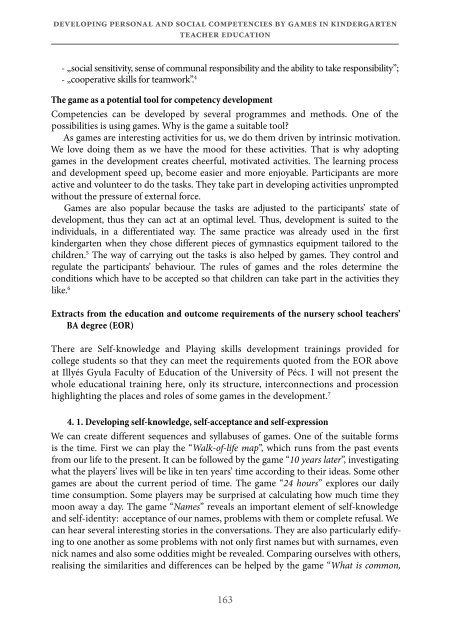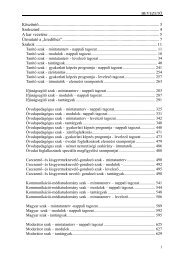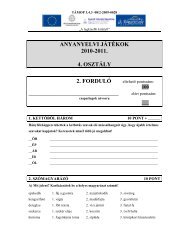ACTA SZEKSZARDIENSIUM - Pécsi Tudományegyetem Illyés Gyula ...
ACTA SZEKSZARDIENSIUM - Pécsi Tudományegyetem Illyés Gyula ...
ACTA SZEKSZARDIENSIUM - Pécsi Tudományegyetem Illyés Gyula ...
Create successful ePaper yourself
Turn your PDF publications into a flip-book with our unique Google optimized e-Paper software.
developing personal and social competencies by games in kindergarten<br />
teacher education<br />
- „social sensitivity, sense of communal responsibility and the ability to take responsibility”;<br />
- „cooperative skills for teamwork”. 4<br />
The game as a potential tool for competency development<br />
Competencies can be developed by several programmes and methods. One of the<br />
possibilities is using games. Why is the game a suitable tool?<br />
As games are interesting activities for us, we do them driven by intrinsic motivation.<br />
We love doing them as we have the mood for these activities. That is why adopting<br />
games in the development creates cheerful, motivated activities. The learning process<br />
and development speed up, become easier and more enjoyable. Participants are more<br />
active and volunteer to do the tasks. They take part in developing activities unprompted<br />
without the pressure of external force.<br />
Games are also popular because the tasks are adjusted to the participants’ state of<br />
development, thus they can act at an optimal level. Thus, development is suited to the<br />
individuals, in a differentiated way. The same practice was already used in the first<br />
kindergarten when they chose different pieces of gymnastics equipment tailored to the<br />
children. 5 The way of carrying out the tasks is also helped by games. They control and<br />
regulate the participants’ behaviour. The rules of games and the roles determine the<br />
conditions which have to be accepted so that children can take part in the activities they<br />
like. 6<br />
Extracts from the education and outcome requirements of the nursery school teachers’<br />
BA degree (EOR)<br />
There are Self-knowledge and Playing skills development trainings provided for<br />
college students so that they can meet the requirements quoted from the EOR above<br />
at <strong>Illyés</strong> <strong>Gyula</strong> Faculty of Education of the University of Pécs. I will not present the<br />
whole educational training here, only its structure, interconnections and procession<br />
highlighting the places and roles of some games in the development. 7<br />
4. 1. Developing self-knowledge, self-acceptance and self-expression<br />
We can create different sequences and syllabuses of games. One of the suitable forms<br />
is the time. First we can play the “Walk-of-life map”, which runs from the past events<br />
from our life to the present. It can be followed by the game “10 years later”, investigating<br />
what the players’ lives will be like in ten years’ time according to their ideas. Some other<br />
games are about the current period of time. The game “24 hours” explores our daily<br />
time consumption. Some players may be surprised at calculating how much time they<br />
moon away a day. The game “Names” reveals an important element of self-knowledge<br />
and self-identity: acceptance of our names, problems with them or complete refusal. We<br />
can hear several interesting stories in the conversations. They are also particularly edifying<br />
to one another as some problems with not only first names but with surnames, even<br />
nick names and also some oddities might be revealed. Comparing ourselves with others,<br />
realising the similarities and differences can be helped by the game “What is common,<br />
163




